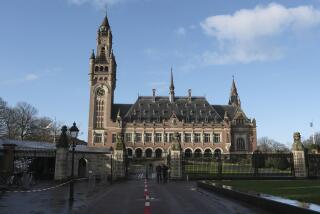Israel announces plans for 3,000 more housing units in West Bank
JERUSALEM – Following a landmark United Nations vote upgrading the status of the Palestinian territories to become a “nonmember observer state” in the international body, Israel said Friday it would construct an additional 3,000 units of Jewish housing in the West Bank.
The government is also moving forward with preliminary planning for a controversial development on the outskirts of Jerusalem that U.S. officials have opposed for decades, according to a government official, who requested anonymity because he was not authorized to speak publicly about the issue.
The hillside development, known as E-1, would connect the West Bank settlement of Maale Adumim with East Jerusalem, cutting off access between the Palestinian cities of Ramallah and Bethlehem. U.S. officials have long urged Israel to freeze the project because they feared it would make it more difficult to create a contiguous Palestinian state.
The decision on E-1 does not authorize any construction, but would clear the way for “preliminary statutory planning,” the official said.
The decision to expand settlement construction surprised even some inside the Israeli government because the Foreign Ministry, after initially threatening to retaliate against Palestinians for the U.N. bid, reversed itself early this week and vowed a measured response.
Some speculated that Israel Prime Minister Benjamin Netanyahu was particularly angry over the harsh words and tone of Palestinian Authority President Mahmoud Abbas’ U.N. speech Thursday night, during which he accused Israel of committing ethnic cleansing against Palestinians.
[Updated Nov. 30, 12:30 p.m.: U.S. officials said they had no advance warning of the Israeli government’s announcement. Victoria Nuland, a State Department spokeswoman, called the move “counterproductive” and said it would complicate peace negotiations. But she declined to comment on whether the Obama administration would take any steps in reaction.
Daniel Levy, a former Israeli peace negotiator with the New American Foundation in Washington, said: “Yesterday at the United Nations the Palestinian leadership endorsed a two-state outcome. Today in its settlement decision on the E-1 corridor, the Israeli government endorsed a one-state outcome.”]
Despite U.S. and Israeli objections, Palestinians won the U.N. General Assembly vote to upgrade their status from “entity” to “state.” Though largely symbolic, the change could allow Palestinians to file a complaint against Israel in the International Criminal Court over West Bank settlement construction.
Most of the international community deems settlement construction as illegal because it occurs on land Israel seized during the 1967 Middle East War.
Israel has frequently retaliated against Palestinians, either for terrorist attacks or diplomatic actions, by announcing more settlement construction.
The U.S. and Israel were among nine U.N. members who voted against the Palestinian resolution, with 138 voting in favor.
The Israeli statement on new housing units appeared to have been hastily arranged Thursday night and was not formally issued by any government agency. Details about when or where construction would take place were unclear, suggesting to some that the announcement was more intended to send a message to Palestinians.
Israeli officials previously threatened other steps in response to the Palestinians’ U.N. bid, including canceling the 1993 Oslo peace accords, which were never fully implemented, and halting the transfer of tax revenues to the Palestinian Authority.
Israel’s opposition Labor Party criticized the timing of the government’s decision, issuing a statement urging Netanyahu to “lower the flames.”
ALSO:
Qatar poet gets life in prison after ‘insulting’ emir
Street protests follow approval of Egypt’s draft constitution
U.N. vote on Palestine status inflicts new divides in Europe, NATO
Times staff writer Paul Richter in Washington contributed to this report.
More to Read
Sign up for Essential California
The most important California stories and recommendations in your inbox every morning.
You may occasionally receive promotional content from the Los Angeles Times.










